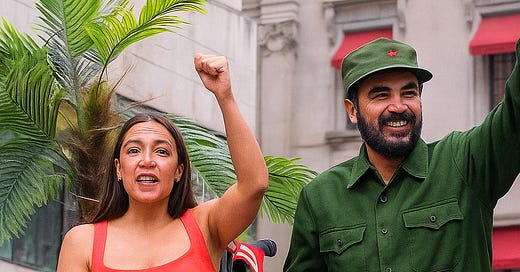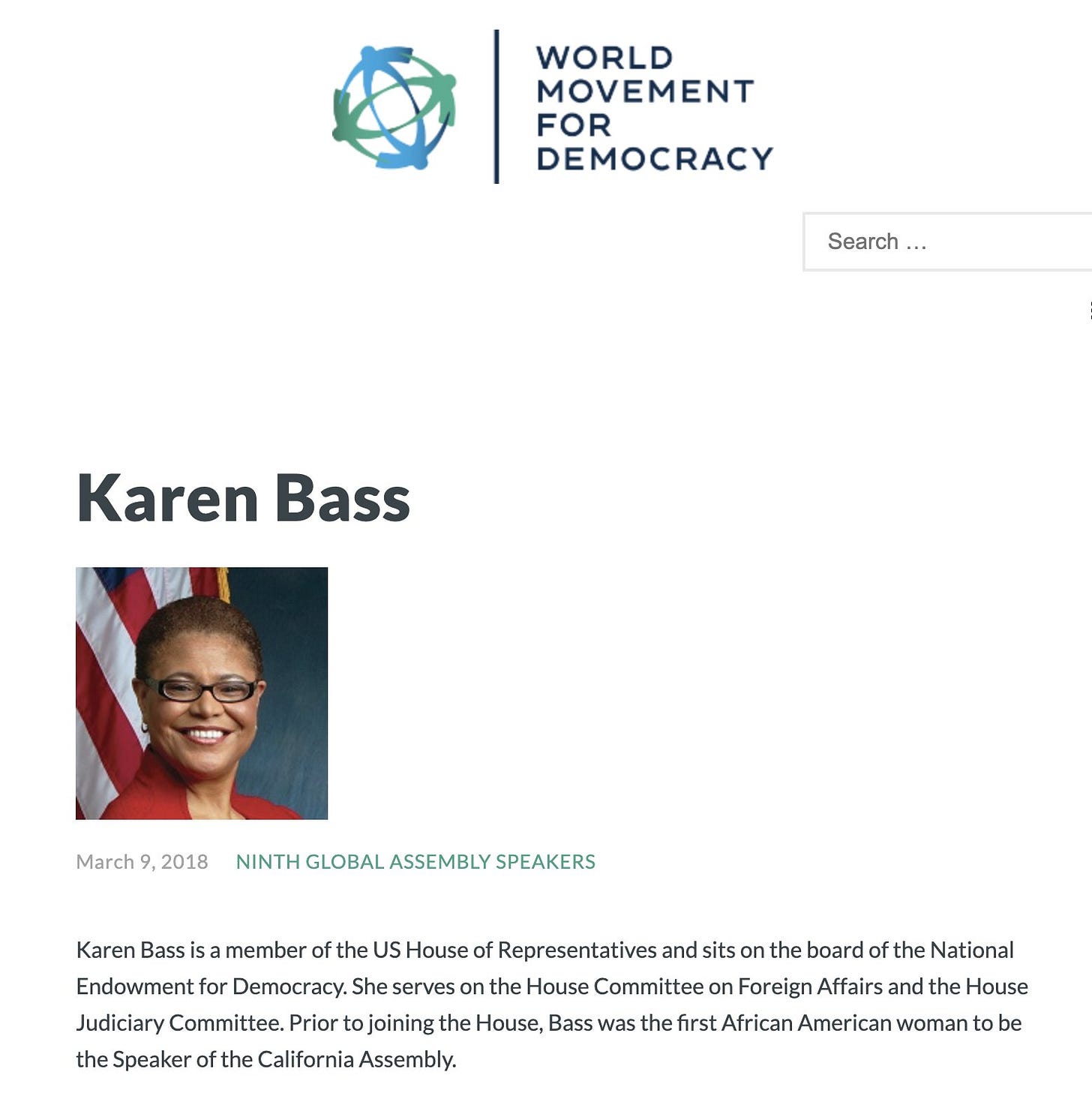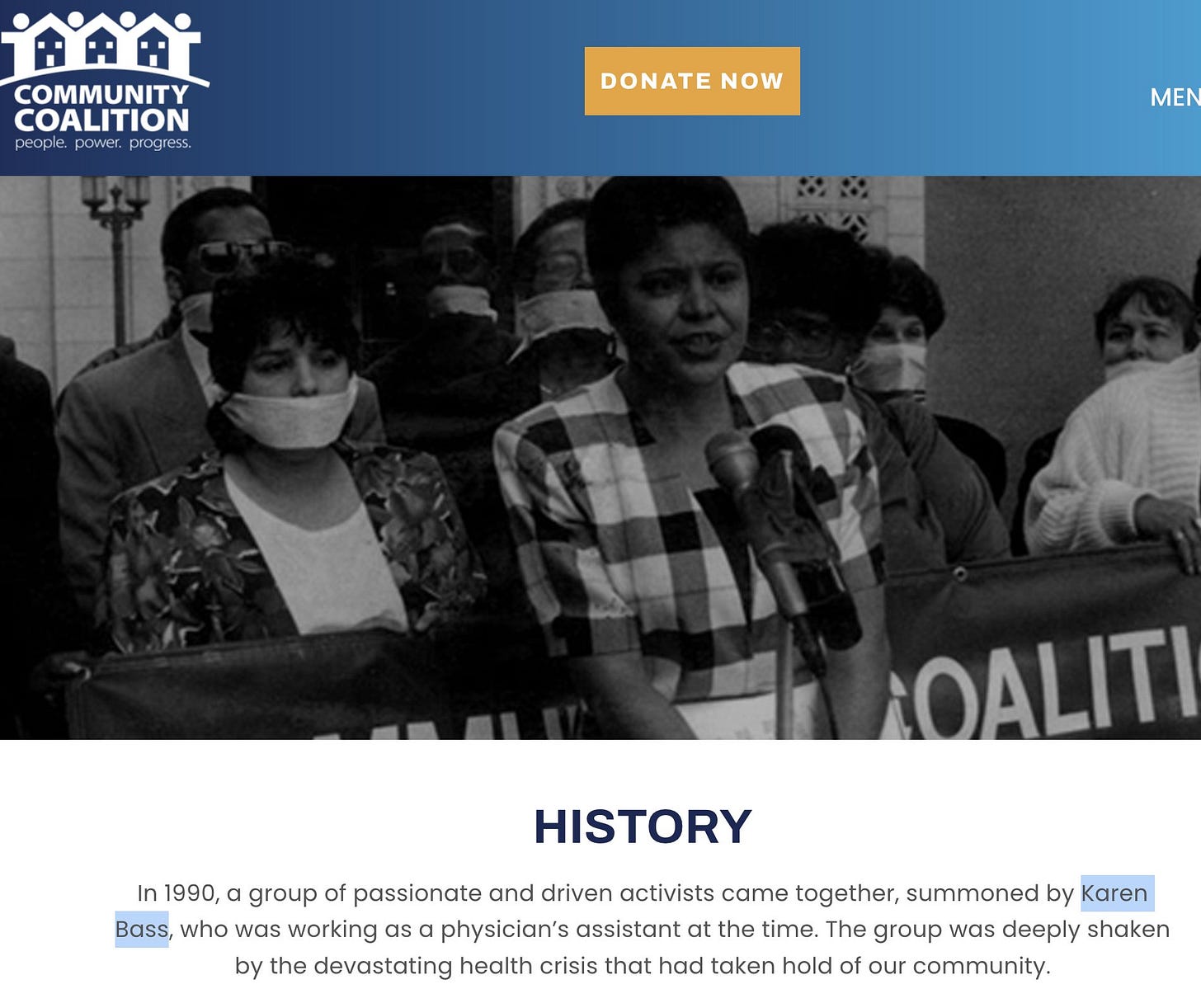🔥 Karen Bass: From Castro’s Cuba to LA’s Burning Streets
A deep dive into the enigmatic career of LA’s mayor, from radical roots to global intrigue.
In the shadowed corridors of American politics, where idealism often masks ambition, few figures have navigated the tightrope of power with the enigmatic grace of Karen Bass.
As the Mayor of Los Angeles, she projects an image of a mild-mannered public servant, a beacon of diversity in a city plagued by wildfires and social unrest. But peel back the layers, and a different story emerges—one of early radicalism, questionable alliances, and a federal corruption case that has yet to touch her Teflon-coated career.
This is no ordinary political profile; it’s a thriller unfolding in real time, and the clues are scattered across an explosive X thread by @DataRepublican,. Buckle up, dear readers, as we dive into the labyrinthine world of Karen Bass—a world where local governance collides with global intrigue.
The Radical Roots: A Young Idealist in Castro’s Orbit
Our story begins not in the gleaming halls of Congress, but in the sultry heat of 1970s Cuba, where a 19-year-old Karen Bass found herself swept up in the fervor of the Venceremos Brigade. This wasn’t your typical college spring break. Founded in 1969, the Brigade was a bold defiance of U.S. travel bans, a joint venture between Castro’s regime and American radicals like the Students for a Democratic Society. Bass, then a philosophy student at San Diego State University, emerged as a leader of the southern California contingent, jetting off to Havana every six months until the mid-1970s. A Ph.D. dissertation later described her as a “brigadista” and organizer, mentored by figures like Dawn Noggle, a mental health director with ties to the movement.
This wasn’t naive idealism—it was a calculated embrace of Castro’s authoritarian doctrine, a rejection of the hippie counterculture that defined her peers. As @DataRepublican’s thread reveals, this early indoctrination set the stage for a career steeped in leftist activism, a thread that runs unbroken through her rise to power. For those of us who fled the shadows of Soviet oppression—myself included—these connections raise red flags. The Venceremos Brigade wasn’t just a youth movement; it was a pipeline for ideological warriors, and Bass was a star pupil.
The Political Ascent: From South LA to the Global Stage
Fast forward to the late 1980s, and Bass was laying the groundwork for her political empire. She founded the Community Coalition (CoCo) in South Los Angeles, a nonprofit that today boasts $31 million in assets and $9 million in annual revenue, including $3 million in government grants. On paper, CoCo’s mission is noble—building “grassroots leadership” through town halls. But dig into the numbers, and the picture darkens. With the lion’s share of its budget funneled into salaries and benefits, CoCo’s impact on the city’s spiraling drug overdose crisis—deaths soaring from 500 in 2011 to 2,500 in 2021—seems negligible. Is this a grassroots triumph or a well-funded façade?
Her political ascent accelerated in the 2000s. Elected to the California State Assembly in 2004, she became the first Black woman to serve, a milestone that propelled her to Majority Whip and Floor Leader roles. By 2011, she was in the U.S. House, representing the 37th District with a laser focus on foreign affairs, racking up over 30 trips to Africa. But it was her 2014 appointment to the National Endowment for Democracy (NED)—an organization with a $350 million federal budget—that catapulted her onto the global stage.
Rising to Vice Chair by 2021, Bass oversaw an entity accused of orchestrating “color revolutions” and regime changes, a charge echoed in a 2016 European Parliament study on Western NGO influence. For a Representative to snag such a role so quickly is unheard of—typically, this is Senator territory. Was this a reward for loyalty or a strategic placement?
The Corruption Conundrum: A Scholarship That Won’t Fade Away
Here’s where the plot thickens. In 2011, while serving in Congress, Bass received a $95,000 full-tuition scholarship from USC’s School of Social Work, a perk cleared by the House Ethics Committee. Fast forward to 2022, and that same scholarship program is at the heart of a federal corruption case:
Mark Ridley-Thomas, a former LA County Supervisor, was indicted for steering county funds to USC in exchange for a similar scholarship for his son, Sebastian.
The dean, Marilyn Flynn, pleaded guilty to bribery.
Prosecutors now call Bass’s scholarship “critical” to their case, hinting at a broader pattern of quid pro quo within USC’s social work program.
Yet, astonishingly, Bass remains untouched—no charges, no investigation.
@DataRepublican’s thread screams foul play:
“When you’re part of the machine… you get protection.”
Is this congressional immunity at work, or is something deeper at play? The double standard is glaring. Ridley-Thomas faces prison, while Bass, who received the identical benefit, sails on. The X thread suggests that her NED ties and D.C. connections may shield her, a theory that resonates with those of us who have seen political elites evade accountability. The Biden administration’s consideration of her for HUD Secretary, where she recommended Xavier Becerra for HHS, a figure criticized for prioritizing human traffickers over child safety, only fuels the speculation of a well-oiled network
The Wildfire Fiasco: Global Ambitions vs. Local Duty
If the corruption case is a slow burn, the 2025 LA wildfires are a blazing indictment of Bass’s priorities. As flames devoured the Palisades on January 7, with dire wind warnings issued, Bass was thousands of miles away in Ghana, part of a Biden delegation to honor a presidential inauguration. @DataRepublican’s thread dismantles her defense of “constant contact,” painting a picture of a mayor more attuned to global diplomacy than her burning city. Critics, including ADN América’s January 2025 report, tie her absence to recent LA Fire Department budget cuts, suggesting a neglect that cost lives.
This isn’t incompetence—it’s choice. Bass’s career arc, from Castro’s Cuba to NED’s boardrooms, reveals a woman who thrives on international stages. Her 2018 speech at the World Movement for Democracy, another NED offshoot, and her diplomatic trips with Obama underscore this globalist bent. But what of the LA residents left choking on smoke and fentanyl? The X thread argues she “doesn’t care about LA residents,” a harsh but compelling narrative given the overdose epidemic’s unchecked rise.
The ICE Riots of 2025: A Venceremos Echo in the Streets
This week, as Los Angeles erupted in chaos over ICE raids targeting undocumented immigrants, Karen Bass’s stance has added a chilling new chapter to her story. On June 5, 2025, federal agents from the Department of Homeland Security descended on Home Depot stores and Ambient Apparel’s headquarters, arresting at least 45 individuals in a crackdown that drew swift condemnation from California leaders. Video footage captured masked agents in tactical gear clashing with crowds, prompting hundreds to rally outside the federal building by 6 PM. Bass, in a fiery statement, decried the raids as an assault on her city:
“We will not stand for this,”
aligning herself with immigrant rights groups and vowing to coordinate with community organizers. Her rhetoric echoed the defiance of Governor Gavin Newsom and Councilmember Eunisses Hernandez, but it stood in stark contrast to the federal authority she’s sworn to uphold.
This reaction makes sense when viewed through the lens of her Venceremos Brigade history. The Brigade wasn’t just about solidarity with Cuba; it was a training ground for resisting American hegemony, a mindset Bass carried into her political career. Her early embrace of Castro’s anti-imperialist stance now manifests in her support for the mobs challenging ICE. The Guardian’s June 7 report notes her “deep anger” at the raids, a sentiment that mirrors the Brigade’s ethos of mobilizing against perceived oppression. For someone who once defied U.S. travel bans to champion a communist regime, backing street protests over federal law enforcement feels like a natural extension of that radical past. It’s as if the streets of LA have become her new Havana
But there’s more at play than ideology. Bass’s support for the rioting mobs could be a calculated move to solidify her base in a city with a large immigrant population. By positioning herself as their protector—coordinating with activist groups while federal agents faced off with protesters—she taps into a wellspring of grassroots support that could shield her from scrutiny over the USC corruption case or the wildfire debacle. Stephen Miller, Trump’s deputy chief of staff, fired back with a blunt:
“Federal law is supreme,” but Bass’s defiance suggests she’s betting on local sentiment to outweigh legal authority. This mirrors the Venceremos strategy of leveraging community mobilization to challenge the status quo, a tactic she honed decades ago. For those of us who’ve seen authoritarian regimes manipulate crowds for power, this pattern is all too familiar.
The Bigger Picture: A Globalist Pawn or Mastermind?
So, who is Karen Bass? Is she a DEI figurehead, as some label her, or a terrifyingly effective activist entrenched in a globalist swamp? The evidence leans toward the latter. Her early radicalism, nurtured by the Venceremos Brigade, evolved into a sophisticated dance with NGOs and political elites. NED’s $350 million war chest, her uninvestigated scholarship, and her role in shaping Biden’s cabinet all point to a player with deep ties to the system. Her stance on the ICE riots, rooted in her Cuban past, reinforces this narrative—she’s not just a local mayor but a global actor, using local unrest to amplify her influence.
For those of us with roots in Odessa, where Soviet machinations shaped our worldview, this story feels eerily familiar. The Venceremos Brigade’s Castro ties, NED’s alleged meddling, and Bass’s Teflon status suggest a playbook of ideological infiltration that transcends borders. Yet, her mishandling of local crises like wildfires and drugs hints at a disconnect, perhaps she’s less a mastermind than a cog in a larger machine, driven by ambition rather than local loyalty.
What Lies Ahead? As I write this, The X thread by @DataRepublican is a live wire, sparking debate and demanding answers. Will the DOJ revisit the USC case, piercing her immunity shield? Will LA voters hold her accountable for the wildfires, overdoses, and now the ICE riots?
Or will her globalist network, bolstered by mob support, continue to prop her up, a symbol of a system that rewards connections over competence?
This is more than a political scandal—it’s a window into the soul of American power. Karen Bass’s story is a reminder that the past never truly fades; it lingers, shaping the present in ways we can’t always see. For now, the dossier remains open, and the next chapter waits to be written. Stay vigilant, dear readers—truth is a fire that burns brightest in the dark.












A spontaneous riot yet rioters had time to get anti- ICE signs printed, distributed, and protesters marshaled over one raid at a hardware store. Just like the anti-Israel college protesters had instant tents to camp in and food delivery on campus. Yet- some still wonder about the possibility of ties to global anti-American dissenters and possible domestic terrorism? The evidence speaks for itself.
Leading light of the Maocrat Party.